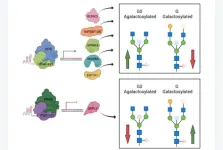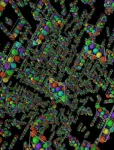(Press-News.org)
“[...] we were able to confirm the functional role of three genes (MANBA, TNFRSF13B and EEF1A1) in the IgG galactosylation pathway [...]”
BUFFALO, NY- January 3, 2024 – A new research paper was published in Aging (listed by MEDLINE/PubMed as "Aging (Albany NY)" and "Aging-US" by Web of Science) Volume 15, Issue 24, entitled, “Mapping of the gene network that regulates glycan clock of ageing.”
Glycans are an essential structural component of immunoglobulin G (IgG) that modulate its structure and function. However, regulatory mechanisms behind this complex posttranslational modification are not well known. Previous genome-wide association studies (GWAS) identified 29 genomic regions involved in regulation of IgG glycosylation, but only a few were functionally validated. One of the key functional features of IgG glycosylation is the addition of galactose (galactosylation), a trait which was shown to be associated with ageing.
In this new study, researchers Azra Frkatović-Hodžić, Anika Mijakovac, Karlo Miškec, Arina Nostaeva, Sodbo Z. Sharapov, Arianna Landini, Toomas Haller, Erik van den Akker, Sapna Sharma, Rafael R. C. Cuadrat, Massimo Mangino, Yong Li, Toma Keser, Najda Rudman, Tamara Štambuk, Maja Pučić-Baković, Irena Trbojević-Akmačić, Ivan Gudelj, Jerko Štambuk, Tea Pribić, Barbara Radovani, Petra Tominac, Krista Fischer, Marian Beekman, Manfred Wuhrer, Christian Gieger, Matthias B. Schulze, Clemens Wittenbecher, Ozren Polasek, Caroline Hayward, James F. Wilson, Tim D. Spector, Anna Köttgen, Frano Vučković, Yurii S. Aulchenko, Aleksandar Vojta, Jasminka Krištić, Lucija Klarić, Vlatka Zoldoš, and Gordan Lauc from Genos Glycoscience Research Laboratory, University of Zagreb, Novosibirsk State University, Lomonosov Moscow State University, University of Edinburgh, University of Tartu, Leiden University Medical Center, Delft University of Technology, Helmholtz Zentrum Muenchen, German Center for Diabetes Research (DZD), King’s College London, Guy’s and St Thomas’ Foundation Trust, University of Freiburg, University of Rijeka, German Institute of Human Nutrition Potsdam-Rehbruecke, University of Potsdam, Harvard T.H. Chan School of Public Health, Chalmers University of Technology, University of Split School of Medicine, Algebra University College, Johns Hopkins Bloomberg School of Public Health, and Institute of Cytology and Genetics SB RAS performed GWAS of IgG galactosylation (N=13,705) and identified 16 significantly associated loci, indicating that IgG galactosylation is regulated by a complex network of genes that extends beyond the galactosyltransferase enzyme that adds galactose to IgG glycans.
“Here, we conducted a GWAS of IgG galactosylation phenotypes in a study that almost doubles the sample size (N=13,705) compared to previous GWAS of IgG N-glycome [33] and focused on the genes with in silico evidence for involvement in the IgG galactosylation process.”
Gene prioritization identified 37 candidate genes. Using a recently developed CRISPR/dCas9 system, the researchers manipulated gene expression of candidate genes in the in vitro IgG expression system. Upregulation of three genes, EEF1A1, MANBA and TNFRSF13B, changed the IgG glycome composition, which confirmed that these three genes are involved in IgG galactosylation in this in vitro expression system.
“Further research is needed to fully elucidate [the] functional mechanism behind their role in ageing and to reveal the complete network of gene interactions regulating the complex process of IgG glycosylation.”
Read the full paper: DOI: https://doi.org/10.18632/aging.205106
Corresponding Authors: Azra Frkatović-Hodžić, Gordan Lauc
Corresponding Emails: afrkatovic@genos.hr, glauc@genos.hr
Keywords: genome-wide association study, glycosylation, glycan clock, immunoglobulin G, CRISPR/dCas9
Sign up for free Altmetric alerts about this article: https://aging.altmetric.com/details/email_updates?id=10.18632%2Faging.https://doi.org/10.18632/aging.205106
About Aging:
Launched in 2009, Aging publishes papers of general interest and biological significance in all fields of aging research and age-related diseases, including cancer—and now, with a special focus on COVID-19 vulnerability as an age-dependent syndrome. Topics in Aging go beyond traditional gerontology, including, but not limited to, cellular and molecular biology, human age-related diseases, pathology in model organisms, signal transduction pathways (e.g., p53, sirtuins, and PI-3K/AKT/mTOR, among others), and approaches to modulating these signaling pathways.
Please visit our website at www.Aging-US.com and connect with us:
SoundCloud
Facebook
X, formerly known as Twitter
Instagram
YouTube
LabTube
LinkedIn
Reddit
Pinterest
Click here to subscribe to Aging publication updates.
For media inquiries, please contact media@impactjournals.com.
Aging (Aging-US) Journal Office
6666 E. Quaker Str., Suite 1B
Orchard Park, NY 14127
Phone: 1-800-922-0957, option 1
###
END
DURHAM, N.C. – If you have a deep-seated, nagging worry over dropping your phone in molten lava, you’re in luck.
A research team led by materials scientists at Duke University has developed a method for rapidly discovering a new class of materials with heat and electronic tolerances so rugged that they that could enable devices to function at lava-like temperatures above several thousands of degrees Fahrenheit.
Harder than steel and stable in chemically corrosive environments, these materials ...
FOR IMMEDIATE RELEASE
Care for patients with human papillomavirus (HPV)-related squamous cell cancers of the oropharynx (an area in back of the throat) is shifting toward community cancer centers, but patients treated in this setting may be less likely to survive, according to new research by investigators from the Johns Hopkins Kimmel Cancer Center and its Head and Neck Cancer Center.
The study, published Jan. 3 in the Journal of the National Cancer Institute, raises concerns about the quality of care that patients with this type of head and neck cancer receive outside of academic medical centers. Patients treated ...
INDIANAPOLIS—A beta blocker typically used to treat heart problems, hemangioma, migraines and anxiety could be a new therapeutic for patients with sickle cell disease. Researchers led by Ankit A. Desai, MD, associate professor of medicine at the Krannert Cardiovascular Research Center (KCVRC) at Indiana University School of Medicine, have been awarded a $3 million grant by the U.S. Department of Defense to evaluate the efficacy of this drug.
Patients with sickle cell disease, a red blood ...
Cleveland Clinic and the University of Western Ontario have been awarded a $4.9 million grant from Helmsley Charitable Trust to build a consortium to develop clinical trial outcome tools for patients with Crohn's disease and permanent ileostomy.
A permanent ileostomy is a surgical procedure to divert stool from the intestine after removing part of or the whole colon. The new Endpoint Development for Ostomy Clinical Trial (EndO-trial) Consortium seeks to develop more effective drugs for patients with Crohn's disease who have undergone ...
Chlorophyll plays a pivotal role in photosynthesis, which is why plants have evolved to have high chlorophyll levels in their leaves. However, making this pigment is expensive because plants invest a significant portion of the available nitrogen in both chlorophyll and the special proteins that bind it. As a result, nitrogen is unavailable for other processes. In a new study, researchers reduced the chlorophyll levels in leaves to see if the plant would invest the nitrogen saved into other process that might improve nutritional quality.
Over the past few decades, researchers ...
BINGHAMTON, N.Y. -- When water vapor meets metal, the resulting corrosion can lead to mechanical problems that harm a machine’s performance. Through a process called passivation, it also can form a thin inert layer that acts as a barrier against further deterioration.
Either way, the exact chemical reaction is not well understood on an atomic level, but that is changing thanks to a technique called environmental transmission electron microscopy (TEM), which allows researchers to directly view molecules interacting ...
New research from the University of Warwick reveals that words like 'sex' endure in our language in a ‘survival of the fittest’ way, similar to natural selection.
Whilst the recent announcement of Word of the Year explores new words, like ‘rizz’ or ‘situationship’, Professor Thomas Hills’ research delves into why some words survive in our modern linguistic landscape, while others don’t.
The study concludes that words with the strongest lasting power are:
Words acquired earlier in life
Words associated with things people can see ...
NYU Grossman School of Medicine’s Vilcek Institute of Graduate Biomedical Sciences and Sarah Lawrence College today announced the launch of a master’s program in genome health analysis (GHA).
Building on the strengths of both institutions, the new program will focus on analyses of patient genomes, the complete sets of genetic information in human cells. New tools have dramatically increased the amount and quality of genomic data available on each patient, but the field is constrained by the small number of experts trained to use and apply ...
A new study from researchers at the University of Colorado Anschutz Medical Campus finds that older adult drivers who are recently diagnosed with migraines are three times as likely to experience a motor vehicle crash. Older adult drivers who reported having ever had migraines in the past were no more likely to have a motor vehicle crash than those without migraines.
Additionally, study results, published in the Journal of the American Geriatrics Society, explored the relationships medications commonly prescribed for migraine management have with increased crash risk.
“Migraine headaches affect ...
BOSTON – Preeclampsia and other hypertensive disorders of pregnancy—which are characterized by high blood pressure with or without organ dysfunction during the second half of pregnancy—carry considerable short- and long-term risks for both the mother and child. Treatment options (other than expedited delivery) remain limited.
A team led by researchers at Massachusetts General Hospital (MGH) and the Broad Institute recently identified several proteins with strong evidence of causal or protective roles for hypertensive disorders of pregnancy, which could provide clues into how the conditions arise and how they might be prevented or treated.
In the study, which ...



